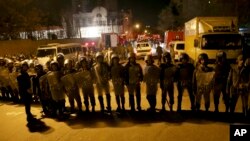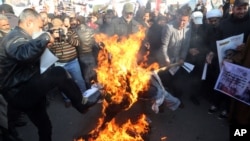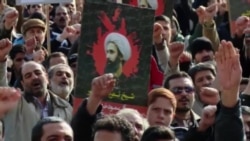When it comes to the deepening rift between Saudi Arabia and Iran, a senior State Department official says the two dominant Middle East powers ultimately need to work things out for themselves.
However, analysts doubt the two countries have the will to mend fences, even though their rift could impact diplomatic efforts elsewhere in the region.
"It is probably not helpful in the long run for [the United States] to own this,” said the senior State Department official Monday.
Saudi Arabia announced Sunday it had decided to sever ties with Iran after protesters stormed the Saudi embassy in Tehran. Bahrain and Sudan followed suit Monday while the United Arab Emirates downgraded relations with Iran.
The protests took place after Sunni-led Saudi Arabia executed a leading Shi'ite cleric, Sheikh Namr al-Namr, on Saturday along with 46 other people. The cleric's execution angered Shi'ites in Iran and other nations.
"They have got to work this out for themselves," said the senior State Department official. "A solution to this tension is going to be long-lasting and sustainable and keep them focused on what we all ought to be focused on, which is larger issues in the region."
Syria political talks
Those regional issues include a U.N. plan to begin mediating talks this month between the Syrian government and moderate opposition. Iran, Saudi Arabia and the United States are among the 18 nations in the International Syria Support Group, which helped craft the plan that includes a cease-fire in Syria. However, Iran is more closely aligned with Syrian President Bashar al-Assad's regime.
"We still hope and expect that the meetings between the opposition group and the regime can happen this month," said State Department spokesman John Kirby.
"Obviously, in light of these events [between Iran and Saudi Arabia], we are watching it closely," he added.
At the White House, spokesman Josh Earnest said there was reason for optimism that the talks, which could ultimately help stabilize Syria, could go forward.
"The reason that Iran and Saudi Arabia have participated in those conversations that are led by Secretary [of State John] Kerry are not out of charity," Earnest said in a Monday briefing.
He said both Saudi Arabia and Iran have "their own vested interest" in trying to bring an end to Syria's chaos.
‘Zero trust now’
In recent days, Kerry and other State Department officials have reached out to Iran and Saudi Arabia to urge both sides to exercise calm.
However, there may be little the U.S. can do in what is essentially a "regional struggle for power and control," said Aaron David Miller, a Middle East scholar at the Wilson Center.
He predicted the increased tensions between the two regional powers and their allies could make it difficult to hold together the diverse international group that has backed talks on a political transition in Syria.
"It is going to make what was mission impossible now mission completely improbable," he said.
Miller also projected that the rift between the two countries could prompt Iran to strengthen its support for Shi'ite Houthi rebels in Yemen, where Saudi Arabia has led airstrikes against the rebels.
"The problem is that there is just zero trust now on both sides," said Atlantic Council analyst Barbara Slavin. "This is their region. They are tearing it apart."
Iran nuclear tensions
The new friction between Saudi Arabia and Iran has also come at a time when Iran appears to be nearing completion of its obligations to get relief from crippling international nuclear-related sanctions.
Iranian officials have said they expect to reach so-called Implementation Day in January.
Kerry has held several rounds of diplomatic talks with Saudi Arabia and other Gulf allies that have expressed concern that an empowered sanctions-free Iran could be destabilizing to the region.
In the wake of the new rift between the two countries, the U.S. may need to again reach out to Saudi Arabia to ease its concerns, said Patrick Clawson, analyst for the Washington Institute for Near East Policy.
"This reassurance would be particularly helpful as the nuclear deal moves forward and sanctions are eased on Implementation Day," Clawson said in a Monday article.
It remains unclear how the increased tensions between Saudi Arabia and Iran will ultimately affect other regional issues where the U.S. has a stake.
However, Kirby said the U.S. would continue to do what it can to try to defuse tensions.
"We have consistently urged everyone to de-escalate tensions in the region so that we can all continue to work on resolving the pressing issues in Iraq, Syria, Yemen and elsewhere in the Middle East," he said.







